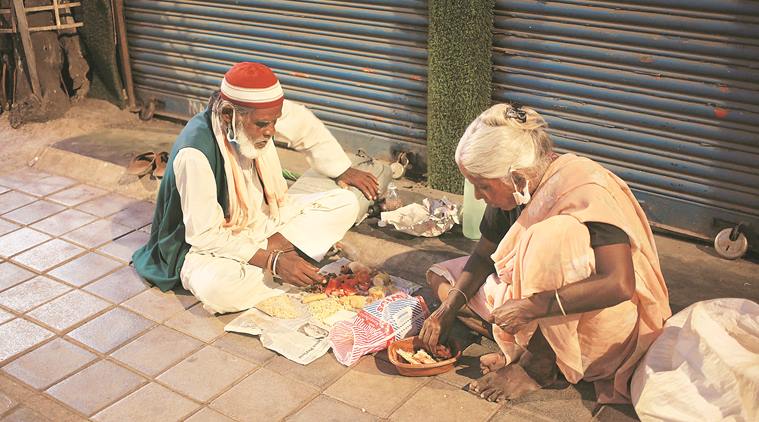Banana, water: Ramzan’s first sehri for most migrant workers stranded in Mumbai
Arranging iftaar, evening meal to end Ramzan fast at sunset, which normally sees a spread of food, was a struggle for migrant workers stranded in Mumbai.
 A couple eat sehri on a pavement at Bandra on Saturday. (Photo: Pradip Das)
A couple eat sehri on a pavement at Bandra on Saturday. (Photo: Pradip Das)
Moinuddin Shaikh’s sehri, or pre-dawn meal, for his first roza this Ramzan was just a modest banana and water. With most of the small eateries shut and little money to buy dry ration, Shaikh and a group of six other migrant workers, stranded at Saki Naka since the lockdown was imposed on March 24, were left with little option.
Arranging iftaar, evening meal to end Ramzan fast at sunset, which normally sees a spread of food, also was a struggle for the group. The seven men had to pool in money, contributing Rs 50 each, to put together some fruits.
Israil Khan (24), who works as a waiter at Sukh Sagar in Girgaum, along with a group of 13 others, too, had contributed Rs 20 each to buy a dozen of bananas for Rs 60 and a kilogramme of grapes for iftaar from the only store open next door. For sehri, they had managed with a little milk and bread toasts.
“One banana and some water is more than sufficient in these times of crises,” Khan said, adding their employer usually provided dinner to the 132 people stuck at a juice centre.
Khan said he had come on Mumbai in December and earned around Rs 8,000 a month, of which he had send about Rs 5,000 home regularly. “There is nothing left for us here now. We just want to go back home,” he said.
At Behrampada in Bandra (east), 21-year-old Shahid Anwar said he had borrowed money from his parents, residents of West Bengal, to manage a little daal-chawal for sehri. “We pooled in whatever money we could and bought some ration. But each day is a struggle now. It is increasingly becoming difficult to get fruits or something nutritious to break fast in the evening,” Anwar said.
Shaikh, too, said that one of his group members had collected Rs 50 from each of the men to buy a few food items for breaking the fast in the evening.
“If we could get some dry ration, we would at least make ourselves a meal in the morning. The food here (Saki Naka) is distributed in the evening, but it is so hot these days that it gets spoilt within a few hours,” he added.
On Saturday, hundreds of migrants living at their workplaces near JJ Hospital, around Mohammad Ali Road, had rushed to fetch milk and bread as some shops in the area had opened for a brief period. For 34-year-old Dil Bahaar, who earned around Rs 10,000 during a good business month, the little money he had on him, along with some that his friend had loaned, had come handy.
“I reach there around 4.45 am, in time to get some milk. The police came soon after, and forced all shops to shut down,” he said. Dil Bahaar has been dependant on the food distributed in the area every evening — around 7 pm — for iftaar, that eventually also doubles up for his dinner.
Along with 11 other men, who have taken refuge opposite the JJ hospital, Dil Bahaar contributed some of his savings to get some ration. “We will cook food with that on days when getting daal-khichdi is not possible.”
Based on a list collated in each ward, the civic body had said two packets of food will be distributed across the city in the evening for those fasting. While the first packet will have cooked dinner, the second would include 5-6 items, including a fruit, lassi, biscuits, and dates, for the pre-dawn meal.
Many migrant workers, including Anwar and Shaikh, however, said they had not received any such packets so far.
Deepak Paradkar, who works with Aajeevika Bureau, an organisation working with migrant workers, said that even as the demand for dry ration has gone up among workers, not all have got access to it. “Many workers called us in distress, hoping for ration. But the demand is higher than what we can provide. Many told us that they will not be fasting as there is uncertainty about where the next meal will come from,” he said.
Shweta Tambe of Habitat and Livelihood Welfare Association, meanwhile, said she has been receiving calls from Bhiwandi, Ulhasnagar and many other workers within the city for dry ration.
“The only option is to universalize the Public Distribution System. The migrant workers who live in Metro cities, far from their families, are being treated in an undignified manner,” Tambe said, adding that the already crumbling health infrastructure in cities was overburdened and the workers should be allowed to go back to their home states.







